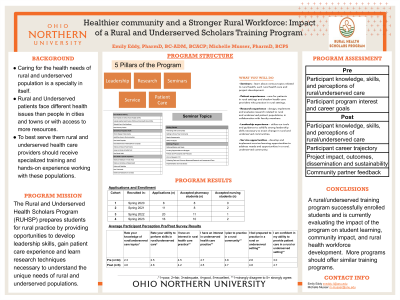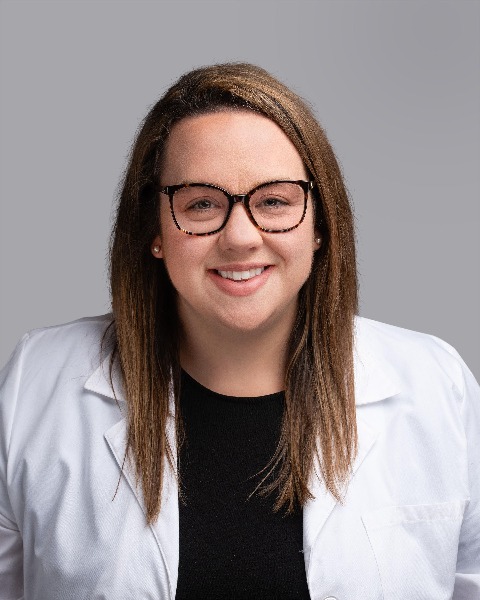Pharmacy Practice
(67) Healthier community and stronger rural workforce: Impact of a rural and underserved scholars training program


Emily Eddy, PharmD, BCACP, BC-ADM
Associate Professor
Ohio Northern University
Dublin, Ohio, United States
Michelle R. Musser, PharmD, BCPS
Professor
Ohio Northern University
Ada, Ohio, United States
Primary Author(s)
Co-Author(s)
Objective : An interprofessional, rural and underserved healthcare scholars program (RUHSP) was developed to offer students an opportunity to develop skills and knowledge to meet the needs of rural and underserved patients. The RUHSP consists of four seminars, practical experiences, service opportunities, and research through student-designed community-based projects. The projects allow students to design interventions to meet a local healthcare need.
Methods: Outcomes for the program are measured with a pre/post-program survey examining knowledge, skills, and perceptions of rural/underserved care. Programmatically, the impact of projects and program sustainability are assessed.
Results: The program has enrolled 42 students (pharmacy and nursing) over four cohorts and implemented 17 community-based projects. Within the four cohorts, 44% percent of the participants have a hometown of under 7500 people. Pre-survey results indicated participants rated themselves on average “fair” regarding their knowledge (2.3/5) and abilities (2.5/5) related to rural/underserved care, but improved to an average “good” rating after completing the program with post-survey results (4.6/5 for both knowledge and abilities). Before starting the program, the majority of participants (61.8%) agreed they planned to practice in a rural setting, but only 20.6% agreed they were prepared. Post-survey results, however, demonstrated 100% of participants agreed they were prepared for rural/underserved practice. Programmatically, community-based projects have been well-received by partners and have shown an impact on participants/community.
Conclusions: The RUHSP was developed to address healthcare students' lack of knowledge/abilities related to underserved care, improving preparedness of students with a passion for this population. Community-based projects within the program also have an impact on local community health and connection with the university.
Methods: Outcomes for the program are measured with a pre/post-program survey examining knowledge, skills, and perceptions of rural/underserved care. Programmatically, the impact of projects and program sustainability are assessed.
Results: The program has enrolled 42 students (pharmacy and nursing) over four cohorts and implemented 17 community-based projects. Within the four cohorts, 44% percent of the participants have a hometown of under 7500 people. Pre-survey results indicated participants rated themselves on average “fair” regarding their knowledge (2.3/5) and abilities (2.5/5) related to rural/underserved care, but improved to an average “good” rating after completing the program with post-survey results (4.6/5 for both knowledge and abilities). Before starting the program, the majority of participants (61.8%) agreed they planned to practice in a rural setting, but only 20.6% agreed they were prepared. Post-survey results, however, demonstrated 100% of participants agreed they were prepared for rural/underserved practice. Programmatically, community-based projects have been well-received by partners and have shown an impact on participants/community.
Conclusions: The RUHSP was developed to address healthcare students' lack of knowledge/abilities related to underserved care, improving preparedness of students with a passion for this population. Community-based projects within the program also have an impact on local community health and connection with the university.

.png)